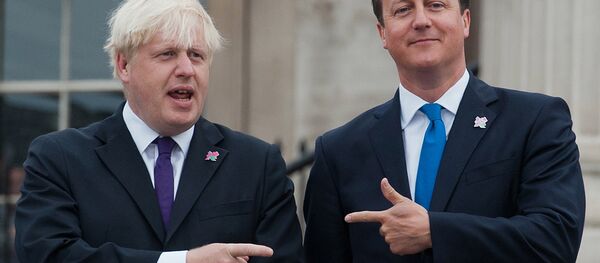As UK Prime Minister David Cameron sets out his case for staying inside the EU, many have raised questions about the impacts any potential Brexit would have on both Britain and the other 27 member states.
Dr Simon Lightfoot, researcher of European politics at the University of Leeds, told Sputnik that there are many reasons why the EU would want Britain to remain inside the union.
"There's lots of things; the UK is a member of the Security Council at the United Nations, it's a significant trading partner, it's got particular foreign policy strengths, so Britain is an important part [of the EU]," Dr Lightfoot told Sputnik.
On top of the practical and economic reasons, Dr Lightfoot says any Brexit would deliver a monumental symbolic blow to the EU project.
"The symbolism of a major country like the United Kingdom leaving the club would send a message to other parts of the world that the European Union was no longer a force to be reckoned with. So, I think the two elements are: what Britain brings to the European Union, but also the fact that if a major member left, the negative impact that would have on the EU's external image would be very significant."
'Deal Will Not Win Over Euroskeptics'
The comments come as both 'In' and 'Out' camps ramp up their campaigns ahead of the June 23 referendum on the country's EU membership.
— Donald Tusk (@eucopresident) February 19, 2016
Just published: A new settlement for the UK in the EU https://t.co/sJd9IgAZER #UKinEU #EUCO pic.twitter.com/RajPB2fFwv
— European Commission (@EU_Commission) February 20, 2016
While the British government has lauded the UK's new membership agreement with Brussels, saying it gives the country "special status", others have been scathing in their criticism, saying that the reforms are minimal, and aimed at merely silencing the Euroskeptic elements of David Cameron's Conservative Party.
I believe Britain is stronger, safer and better off within a reformed European Union. My statement on tonight's deal https://t.co/7XCOHfQFTR
— David Cameron (@David_Cameron) February 19, 2016
The deal has ensured the UK can apply some limits to the payment of in-work benefits to new arrivals in the country, and included safeguards to non-Eurozone countries, however Dr Lightfoot says the agreement will not be enough to convince Euroskeptics to remain in the EU.
"The European Union is built on compromise and if the British government got everything it wanted, then that would create a problem for other states. I think the thing about the deal is that if you're a Euroskeptic cabinet minister, it was never going to be good enough because the only thing that works for you is Britain not being part of the union."
'Unprecedented' Uncertainty
Amid accusations of scaremongering on both sides of the debate, Dr Lightfoot told Sputnik that much of the campaigning is likely to have some similarities with the 2014 Scottish independence referendum.
"I think what you found, particularly in regards to the Scottish referendum, was that people were being asked to make a choice about something they understood and knew, for its faults, or an unknown future.
"So, the issue we're going to hear about over the next months is all about the unknown. The supporters of Britain leaving are going to argue that we could be like Norway or Switzerland, whereas the people arguing in favor of Britain remaining as part of the European Union will be saying 'we don't know what's going to happen.' There will be lots of stories about the possible economic costs and consequences of us leaving, so that level of uncertainty — that we don't know what happens in a situation like this — is unprecedented."





